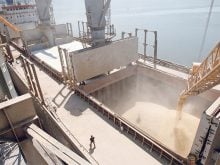OTTAWA — An international relations expert urged Canadian farmers to take advantage of the opportunities afforded by the country’s Indo-Pacific strategy.
Janice Gross Stein, who was co-chair of the advisory committee that helped create the strategy, said the market is the fastest growing for exports and will account for 60 percent of the world’s growth.
“You are, frankly all of you, global exporters but you are now exporting into regional markets,” she told the Canadian Crops convention. “That’s a strategic challenge for the next 10 years.”
Regional institutions are replacing international institutions such as the World Trade Organization and Codex, which she described as “paralyzed.” Stein predicted a decade of market turbulence as great powers such as the United States, China and Russia compete and the world adjusts.
The newly formed Indo-Pacific Economic Framework will set health and safety standards in the region, she said.
“I cannot overexaggerate its importance,” she said.
As Canada establishes its presence there, organizations representing farmers will be able to create relationships on the ground.
“We will have an agricultural and agritech hub in the Indo-Pacific. They’re just deciding on the location,” she said. “The location of the trade hub will be in Singapore.”
Stein said relationships are critical in the Indo-Pacific and showing up is the single most prerequisite for success. Other countries are known for repeated engagement and she said Canada must do the same.
“You show up once and then you show up again, and then you show up again, and then you show up again,” she said.
Regionalization has occurred as globalization stalled, with a significant drop in global trade occurring after the financial crisis.
Protectionism is on the rise. Stein said U.S. president Joe Biden’s administration may be the most protectionist in history.
“This is no small challenge for those of you in this room,” she said, observing that 70 percent of Canadian exports go to the United States.
Other markets for Canadian agricultural products are supporting their farmers extensively. While Canadians may call that protectionism, they call it support, she said, and Canada has to have a consistent strategy of selling better quality, more sustainable products to catch the attention of those markets.
She urged farmers in the room to double down on supporting their organizations that work on the export and market development side.
Stein said the period of the 1990s and early 2000s, when markets functioned with the greatest autonomy ever, is over.
“We are in a new period that I think will last at least 10 years where governments, the big powers who set the framework here, who compete, will use markets for strategic purposes,” she said. “We all have to adjust. We have to get that expert knowledge in place and we have to work within that system to take advantage of what it means for us.”
She also warned that advanced technology, which includes agricultural technologies, is at the forefront of competition between the U.S. and China. That could have great implications for markets and sustainable agriculture.
Stein added the emphasis on the Indo-Pacific won’t change regardless of which political party is governing Canada because the opportunities are just too great.
But governments don’t grow trade, she said, pointing to the agreement with Europe and the disappointing results for many sectors.
“Governments open doors for you to go through,” she said. “For all sorts of reasons, our exporters across the system in Canada did not go through those open doors in Europe.
“We can’t do that again.”


















